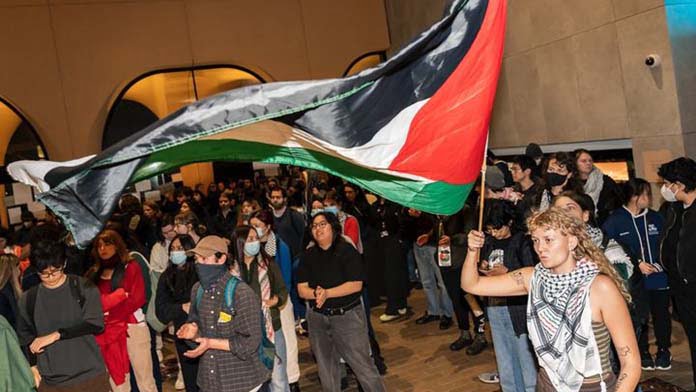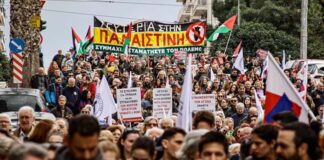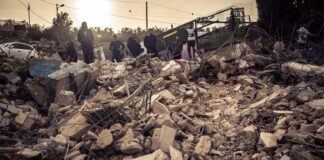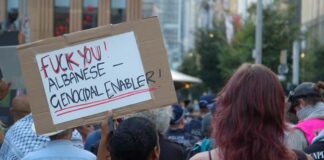A month after their encampment on South Lawn began and eight days after they occupied Mahmoud’s Hall (formerly the Arts West building), students at Melbourne Uni have ended their occupation and encampment after scoring an initial win in the fight to cut the university’s ties with Israel.
“The university has finally agreed to meet an important demand of our campaign: to disclose all research partnerships with weapons manufacturers, including Lockheed Martin, Boeing, and BAE Systems,” Dana from Uni Melb for Palestine explained.
But the campaign at Melbourne Uni is far from over.
“This is a first step,” Dana said. “Divestment from those that profiteer from genocide remains our number one demand and we will not rest until full divestment is achieved.
“We stand by our claim that the University remains complicit in the genocide in Gaza.”
The university has made a series of promises to protest organisers. Occupier Cooper told Solidarity, “The university has agreed to release a statement disclosing links with weapons manufacturers, and has also said that they’ll run an ethics review investigation into their courses that are linked to the weapons manufacturers, in faculties such as Engineering. They’ll also run a series of lectures on Palestine ‘from both sides’, in their words.
“There is already publicly-available information, but it’s a step forward that management are willing to publicly admit their links to weapons companies. In the past they dodged the truth. In a staff town hall, they said that they don’t have any direct links with weapons manufacturers.”
However, when the university finally emailed students on Friday morning, they said any disclosure may be qualified by consideration of, “confidentiality obligations, national security regulations and laws, and the safety and security of our researchers”.
They also failed to mention Lockheed Martin and Boeing, after verbally agreeing to list them as companies they would provide more information on their partnerships with.
The university’s statement so far has fallen short of its promise to the occupation. If the university reneges on its agreement, the campaign will need to be ready to respond.
But they are now in a much better position to do so, having built a real base of support on campus and shown their capacity to mobilise.
Serious
“The camp raised the whole level of the movement and what was possible,” Cooper explained.
“The numbers of people that joined the organising grew from dozens to 50 people consistently meeting and organising every night.
“The escalation in occupying the building showed how serious the movement was and raised the stakes. The whole movement had an even bigger lift with the clear ability to pressure management and led to constant negotiations with them every day.
“Over 100 people were staying in the occupation and it’s really had a galvanising effect. Every day hundreds of people came out for snap rallies to defend the building. Staff had a permanent roster to picket and defend the building and big union rallies and of course, incredible donations and general support from the community.
“University management wanted to end the occupation and they were desperate to get us out. But they’ve been unable to do it because of student and staff action that has made it very politically difficult for them to break it, either through police action or suspensions.
“From the first day the university said that they would send the police in if we didn’t vacate the building. By 2.30pm that day we had people picket, sit in and barricade themselves in. And more and more people began to join the pickets on each side of the building.
“So when the police arrived, they just scouted it out and left.
“The university put up notices around the campus to say members of the public were banned from attending protests on campus. The next morning the NTEU called a protest and we supported and built it.
“Hundreds of staff came out at the end of the workday to rally and a number of community speakers and speakers from other unions came onto campus to defy the order and speak. That made the idea that anybody who was not a student or staff was going to be referred to police a dead letter.
“They stuck up notices around the building saying people were trespassing and threatening misconduct against students. They then posted security guards out the front asking for people’s ID and trying to get the details of anyone who went into the building to pursue disciplinary action, as well as blaring the notice on loudspeakers and constantly coming in and giving people the notices as intimidation.
“They’ve been relentlessly threatening us every day but haven’t been able to follow through on it.”
The scale of the movement meant that the university was unwilling to use police to clear students out of the occupation and break it by force.
“Considering we’re going into the holidays, we need to keep the campaign alive and prepare to hit the ground running in semester two,” Cooper said.
“I think a big part of that is political consolidation around an overall understanding of how the fight against the university’s ties to weapons companies fits into the Australian government’s agenda and its support for Israel’s genocide that we’re fighting overall. We’re going to need to prepare to go into next semester with even stronger, larger, more defiant actions.”






